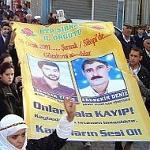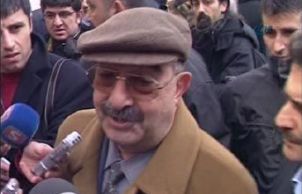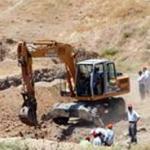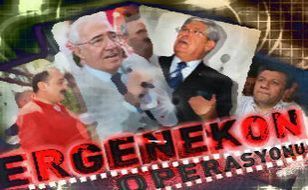AA: I was with the PKK from 1975 to 1985. My connection to the PKK started when I was a high school student in Adana and continued when I left school in 1977.
Did you go up the mountains?
In Turkey I did not, but I stayed in all the PKK camps in Northern Iraq, what is called Southern Kurdistan. I was working as a messenger and guide. I carried important messages from and to a PKK leader called Duran Kalkan and the leaders of other camps. I also took provisions to the camps from villages and guided groups from one camp to another. I guided the group that came to Turkey from the Mahzun Korkmaz camp and carried out the attack in Şemdinli Eruh in 1984, I brought them to the Turkish border. They entered Turkey and attacked.
This was the PKK’s first attack. How did you then join JITEM (Gendarmerie Anti-Terrorism Intelligence)?
I left the PKK in 1985 because I had had enough of the executions within the organisation. The last drop for me was an attack on a hamlet. No one was going to be left alive. I had done the reconnaissance for the attack. One day before the attack I fled from the PKK and told the villagers about the plan. When the villagers saw me with my guerrilla clothes and gun, they called the gendarmerie (security force attached to the army which polices rural areas). They came to the village with a military helicopter and took me.
I will ask you later why you left the PKK. You said that you were fed up with the executions. Did the PKK not look for you later, did they not try to punish you? You informed on them.
I informed on them. I was questioned for 50 days in Siirt, and I wrote a 17-page statement. The superiors in Ankara said, “He has been in the organisation for such a long time, he has got a past. 17 pages is not enough.” The questioning officer told me to write more, so I wrote around 130 pages. In 1977, I was responsible for the military wing of the PKK in Nizip…
At that time you allegedly killed six young nationalists. Did you write about those murders?
No. I did not write about the murders I committed against those we called fascists in Nizip. I wrote about the PKK camps I had stayed at abroad and about the PKK militants I knew. I did not write about any villagers who gave us food. During questioning, they showed me the written statement of Sabri Ok, a high-ranking leader they had caught previously. He had explained everything anyway. Later, Sabri Ok became PKK officer for prisons. They claimed that he had carried out a self-criticism later. But what he wrote in his statement was no different from what an informant would write. The difference to me was that he did not apply for informant status. I did, and I benefited from the Remorse Law. I was taken to Diyarbakır prison.
How did you protect yourself from the PKK members in Diyarbakır prison?
I went to the informants’ cell. They held those who gave themselves up and turned informant in a different place, not among the PKK members. That’s why it was not dangerous inside. Outside is dangerous.
How did you join JITEM?
Because of the Remorse Law I stayed in prison a third of my 15-year sentence. In 1990, I was released. They immediately took me to the military, because I had deserted to Southern Cyprus during my military service in Cyprus. They sent me to Kars to complete my military service in a tank unit. One day a soldier in the battalion said, “Colonel Arif Doğan called on the phone for you. He will call again.”
Arif Doğan is one of the prime suspects in the Ergenekon trial, currently in detention, is he not? Bombs and guns were found at his home and office.
Yes. Up to then, I had never heard of Arif Doğan, and I still have never met him face to face. I only talked on the phone. He was the Diyarbakır JITEM head. He called me again. He told me that Cem Ersever was with him and had recommended me to him. I had met Major Cem Ersever at the Siirt Regiment when I was questioned. I had chatted to him. He was a person who knew a lot about the PKK.
How many years did you work for JITEM?
Nine years. It was 1990…They said, as if they were doing me a favour, “you are doing your military service in Kars, but your family is in Osmaniye. If you want, we can have you brought to Diyarbakır, closer to your family, and you can do your military service in the gendarmerie.” I agreed. At that time there was no mention of JITEM. […]
How did you interpret this special interest from a commander?
I thought that Cem Ersever wanted me in order to make use of my experience. First they took me from Kars to the Privates Education Regiment in Silvan, where they brought other informants too, Ali Ozansoy, Hüseyin Tilki, Ali Timurtaş, Hayrettin Toka…Then they sent us to JITEM in Diyarbakır, but we did not know it was JITEM. We thought we were going to do our military service under the command of the Diyarbakır Gendarmerie for Public Security. We were five, six people…We thought that we were supposed to wear civilian clothes because of our special status, our experience with the organisation, but…
At that time, who was Diyarbakır JITEM commander? Arif Doğan?
No, he had gone, and Cem Ersever had taken his place. His deputy was Aytekin Özen. It was Ersever who told us that we had come to JITEM. “This is JITEM. You will be under my command, wear plain clothes. When you collect intelligence and go on operations, you will wear arms for your own protection.” Just think, the other soldiers had G3 rifles, we were given guns.
How long did you work for JITEM?
It started when I was a soldier in 1990. When I finished my military service, I continued with JITEM as a civil servant until 1999. First they planned to employ us as terrorism experts, then as expert sergeants. But then they turned us into civil servants.
I don’t understand…
They applied Law No 657 on Civil Servants and really made us civil servants. We were officially intelligence officers. The same laws applied to us as to a post office employee, and we had been turned into civil servants working for the military. We had pay slips, taxes, and the right to compensation and a pension. We got a wage, ust as a noncommissioned officer, or a JITEM commander got a wage. For instance, I had a look at the pension fund website on the Internet, under the name Aziz Turan…If I work another fifteen years, I can retire.
Your name was changed to Aziz Turan, and Abdülkadir Aygan was registered to have died in combat, is that right?
Yes. My criminal record was also cleaned.
How many activities did you take part in when you worked for JITEM?
They called them “operations. For instance, a criminal was identified. Normally what happens? The security forces catch this person on demand of the prosecution and the prosecution takes that person to court. The person, depending on the crime, goes to prison or not. But JITEM operations were not like that. There were local agents and informants among the people. They told JITEM about those providing the PKK with provisions or having contact with the organisation. Then JITEM did its job.
What does “do its job” mean in JITEM speak? Killing?
“Doing its job” means “illegally taking a person to JITEM, questioning them, killing them and getting rid of the bodies by burning or burying them.” The importance of the operation depended on the importance of the person to be killed. The JITEM commander sometimes informed the Gendarmerie Public Security Gendarmerie Command, and they sometimes informed the Emergency State Governor’s Office, and sometimes they were not informed.
During your time at JITEM, how many people did you take and kill like that? Did you commit unsolved murders?
If you ask me how many of these events I witnessed, around 30…Not all JITEM commanders were the same. Some ordered these kind of things, some did not. Some only asked for intelligence reports and the organisation of informant and agent networks. Also, I had a lot of duties in JITEM.
Such as?
I interpreted when our commanders met with Barzani and Talabani (then the Iraqi Kurdish leaders of the Kurdistan Democratic Party and the Kurdistan Patriots’ Union). At one point I picked up the Iraqi Kurdish Peshmergas wounded in clashes with the PKK and brought them to the airport to be taken to Turkish military hospitals. I translated documents that came into the hands of JITEM into Turkish. I cracked codes. That is why I did not take part in all JITEM operations. But from what I have heard and seen, I would claim that 80 percent of the unsolved murders and crimes in the region were carried out by JITEM.
There is talk of 18-20 thousand murders without known assailant.
I think that is an exaggeration.
How many people do you think were killed by JITEM?
I can only guess in Diyarbakir, not in other provinces like Elazığ, Van, Mardin, Batman… They also had JITEM. During the ten years I was in Diyarbakır, there might have been 600 to 700…but this is a guess.
As a JITEM employee, did you kill anyone?
I do not want to answer this question.
During the time you worked for JITEM, there was a peak in murders without known assailants. How many murders did you witness?
Yes, this was the time with the most murders. They started in 1993 and continued until 1997, until the Susurluk event. Especially in those four years, there were many murders.
Who was Diyarbakır JITEM commander at that time?
JITEM commander was Abdülkerim Kırca, and Diyarbakır JITEM team commander was Zahit Engin. I personally witnessed around 30 operations during that time. But there are hundreds of operations and murders during that time that I did not take part in or witness. Our group carried out around 30 to 40. And then there were the ones that the Diyarbakir team did under the command of Zahit Engin.
Did all JITEM operations end in death?
They all did. I will tell you an interesting story. There was a young man called İhsan Haran, he was said to be a PKK member. His family had migrated to Diyarbakır from an emptied village in Lice. […] He was taken to JITEM and questioned. Then he was taken in the direction of Silvan, and he was left on a piece of land, with a bullet in his head. Later I heard from commander Abdülkerim Kırca that he did not die from that bullet. He walked to Batman and went to hospital. He then reported what had happened. The Batman team was informed, and they told the Diyarbakır team.
And?
They called Kırca on the phone and told him. He said, “Okay, take him to your team immediately, wait. We are coming.” Kırca told me this himself.
Why would a commander tell you this?
He was accusing the ones carrying out the first execution of having botched the job. He said, “The idiots did not kill him. The guy went to the city and to hospital. We went again and completed the job.” Abdülkerim Kırca took some staff with him to Batman, and they took the young man to the plot of land again and killed him. […]
Did you witness this young man’s killing?
I witnessed the first execution. Kemal Ümlük and expert sergeant Yüksel Uğur were there. They took him behind a heap of earth and killed him at night. I did not see who killed him. He was questioned at JITEM and then taken to the plot of land by car.
Why was he killed?
Because he was supposed to be a PKK member…In the Diyarbakır area JITEM generally got its information about the PKK from informer Serpil Toprak. She also worked for JITEM as a civil servant. For instance, it was she who made JITEM take a young man called Mehemt Salim Dönen and his uncle from Silvan. She saw them at a military hospital. The young man was undergoing his medical examination prior to starting his military service and had come with his ncle. Serpil told me that we should call the commander and tell him. Kırca was having dental treatment at Dicle University hospital. We called him. “Do the necessary and take him. I’m coming.” We went to the military hospital by car and took the young man and his uncle to JITEM. The commander came from the dentist’s and started the questioning.
How were they killed?
The uncle had no connections, but we also took him so that he could not report anything. Uncle and nephew were strangled at JITEM and thrown out on the Silvan road.
Did commander Abdülkerim Kırca strangle them?
No, he gave the command. Sometimes when there was questioning with torture, the commander stayed in the room, sometimes he went to his own room and had a drink. These murders were always carried out at night, and torture was carried out after work hours in the evening, when the regular soldiers had gone back to their ward. There were ordinary soldiers working as tea amkers, post officers for JITEM during the day. […] There were other military units and institutions in the area. They were not supposed to hear the sound from the torture. […]
How many people from JITEM stayed behind for a night shift for torture and executions?
Depending on the job, four to five people.
How and by how many people were the victims strangled?
With a strangling wire or a cable, sometimes a strong TV cable. Either two or three people strangled them. Torture lasted one or two nights. They were not killed immediately. So that they would not die without making a statement, they were given a slice of bread.
The young man who was killed with his uncle, had he not left the PKK?
Seeing as he was going to the military, he had left the PKK, because a PKK member does not go to the army. Especially not someone who had a higher position…But even if they had left the PKK, they were killed by JITEM. For example, there was a young university student called Servet Aslan. He had a girlfriend called Fatma from Mersin. There was no accusation made about the girl, she was not involved. Following a statement by civil servant informant Serpil, these two university students were taken in after being found walking hand-in-hand in Diyarbakir city. The young man had never gone to the mountains, and he had his girlfriend with him.
What does that mean?
They were in love and they were leading a normal life. A PKK militant would never walk through Diyarbakır city hand-in-hand with a girlfriend. But although the young man cried and said he was not with the PKK…
They were also killed?
Yes, they were also killed…There was a Sergeant Major called Mehmet Çapur. Kırca gave the command. The young couple were taken in the direction of Sivas. They were killed and thrown at the roadside. They were questioned and tortured for two days before. Abdülkerim Kırca himself tortured that girl.
Where is the informant Serpil Toprak now?
She was transferred to Erzurum, where she continued as a civil servant and also completed her nursing education which she had interrupted before. JITEM organised her college registration. We heard that she married a lecturer there.
When you took people outside of the city to kill them, did you put them in the boot of the car?
Sometimes we took them in the backseat, between two members of staff. Sometimes we took them covered in a coat, as if they were ill.
How far out of the city did you go to kill them?
For example, İdris Yıldırım was taken from Silopi (a district in Şırnak) and taken to Elazığ, 150 km away. The reason was that the JITEM employee responsible for his capture lived in Silopi and feared suspicions. He was killed far away in order to protect a JITEM informant. His body was burnt so that no one would identify him.
Who did you work with at JITEM?
From 1990 I worked for Cem Ersever and his deputy Aytekin Özen for about two years. When they left, Cahit Aydin and his deputy Nurettin Ata took their places. Then Abdülkerim Kırca came. I worked with him the longest. Normally each commander stayed two years, but he stayed three, four years. I also worked with Ali Yıldız and Cemal Temizöz.
Did you only witness what Abdülkerim Kırca did? What did the others do?
The most murders happened during Kırca’s time. There were some during Cem Ersever’s time, but not so many. For example, the next commander, Ali Yıldız, acted politically. He never said in front of informants, “Take this person in.” He acted as if there was only normal intelligence reporting. But the Diyarbakır JITEM team led by Zahit Engin was under his command, and they constantly took people to JITEM, questioned them and killed them. We saw and heard about this. People were screaming in the cells and later disappeared. There was a waste container behind the building. We saw how Şehmuz Çavuş or others from the team took the clothes and personal belongings of people there and burnt them. (ND/EÜ)
* This interview was published in Taraf newspaper on 27 January 2009. The headline was changed by bianet.













